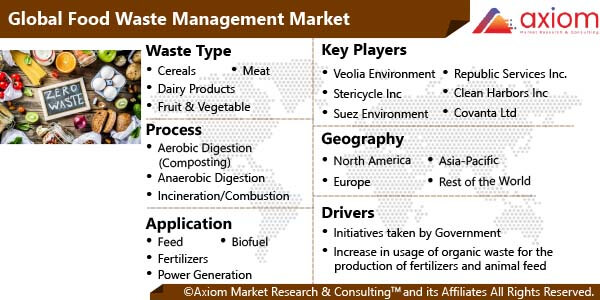Globally, food waste and its effective management has become an increasingly recognized issue over the last few decades. Food management is also a major source of greenhouse gas emissions and cities are key actors in the global mission to reduce the impact of climate change. Recycling the food and other organic waste is a fresh idea that can produce both economic and environmental savings. Developed countries like Singapore are working effectively for food waste management as the amount of food waste generated in Singapore has increased by about 40 per cent over the past 10 years and is expected to increase with our growing population and economic activity.
Food Waste Management Market Outlook
The food waste management market has shown sustainable growth owing to rising demand for reduction of greenhouse emission, increase in the usage of organic waste to produce animal feeds and fertilizers and rising energy requirements. Moreover, rapid industrialization, the importance of innovation and R&D for developing efficient food waste management system is expected to support the market of food waste management across the globe.
Food Waste Management Market Segmental Overview
The report analyses the food waste management market based on type, process, application and geography.
Food Waste Management Market by Type
Based on type, the market is segmented into cereals, dairy products, fruits & vegetables, meat, fish & seafood, oilseeds & pulses, processed foods and coffee grounds & tea. The fruits & vegetables segment accounted for the largest market share in 2016. Fruits & vegetables have a low shelf life and require proper handling and storage. Waste from fruits & vegetables due to its high biodegradability poses environmental problems and loss of valuable biomass and an economic cost more than other food waste.
Food Waste Management Market by Process
Furthermore, based on process the global food waste management market is categorised into aerobic digestion, anaerobic digestion and incineration/combustion. anaerobic digestion process is the most widely used process and accounted for the largest share in 2018. Anaerobic digestion process produces high-quality biproduct such as compost which is a premium quality organic fertilizer and causes less environmental pollution. Food waste management industry recycle around 97% of feed litter generated to produce animal feed and organic fertilizer. Based on physical state of the waste generated different processes are employed.
Food Waste Management Market by Application
Based on application, this food waste management market is classified into animal feed, fertilizers, biofuel and power generation. The animal feed segment of the food waste management market, by application, accounted for the largest market share in 2016. Converting food waste into animal feed is an economic and ecological way of treating the waste.
Food Waste Management Market by Geography
Geographically, the global food waste management market is categorized into North America, Europe, Asia Pacific and Rest of the World. Rest of the world comprises of Latin America and Middle East & Africa. In 2018, North America held the largest market share of the global market owing to Stringent food safety legislations imposed by the government and growing awareness among the U.S. & Canadian population about food wastage is the main factor behind the dominance of the North America food waste management market.
Food Waste Management Market Key Players
Key players of the global food waste management market are Veolia Environment, SUEZ, Waste Management, Inc, FCC Environment Ltd, Remondis SE & Co. KG, Stericycle, CLEAN HARBORS, INC, Covanta Holding Corporation, Advanced Disposal Services, Inc, Waste Connections, Veolia Environneme, Waste Management, Inc, Republic Services, Inc, Remondis SE & Co. Kg, ANDRITZ , Stericycle, Waste Connections, CLEAN HARBORS, INC, Covanta Holding Corporation, Biffa plc, Rumpke, Advanced Disposal Services, Inc, Cleanaway, SMITH RECYCLING (MILTON KEYNES) LIMITED, Biancamano SpA, Quest Resource Management Group, ReFood GmbH & Co. KG, etc. Mergers, acquisitions and partnership are the key strategies adopted by the prominent players to reinforce their position in the global market.











